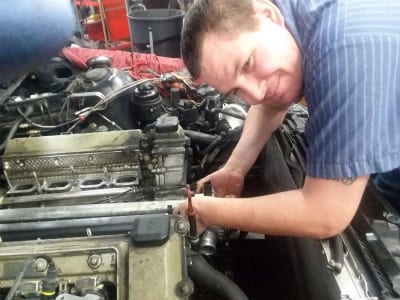Written By: Chelsea Castonguay
When he was a young boy, Drew knew what he wanted to do with his life. While most young people may not be sure of their path to a career, Drew knew he wanted to be a pilot in the Navy. With dogged determination, he began to forge his path with a single-minded ambition; to sit in the cockpit of a F-14 Tomcat. However, the journey to this goal took many unexpected twists, with a surprise diagnosis of Klinefelter Syndrome, changes in plans, heartbreak, and much self discovery.
Elementary school:
Born and raised in San Diego, California, Drew was a student who was initially misunderstood by his teachers, but ultimately proved them wrong. After being forced to repeat the first grade when his teacher determined he couldn’t read, Drew was recognized as being an exceptional student, and tested for the Gifted And Talented Education program, or GATE, at his elementary school. After completing first grade for a second time, it was discovered Drew was actually reading several grades above his own, and had advanced math, reading and comprehension skills.
However, despite his academic success, Drew describes himself as being a child who “didn’t have a whole lot of friends.” He says part of this was due to his physical stature; growing up, he was thin and smaller than his peers, weighing only about 60-70 pounds. Another unseen issue was the violence Drew was experiencing at home, which translated into outbursts of anger at school and with his peers. According to Drew, he was “very angry”, and constantly finding himself in fights. In fifth grade, his family moved out of his childhood home, leaving Webster Elementary behind.
Middle school: “I would always turn to anger.”
By the time he entered middle school, Drew made a few friends, and found he was popular with certain crowds. Academics continued to come easy for him; he developed an interest in history, and continued to excel in math and reading. Physical education class proved to be a struggle at first, as he said “I didn’t really feel active; I didn’t have the drive to do many things. I didn’t want to do or play sports.” Despite his reluctance to play sports, Drew found himself drawn to football, which he enjoyed despite “not being able to catch anything.” Regardless, this led him to running, which he greatly enjoyed.
Unfortunately, his anger issues continued to surface, resulting in Drew being kicked out of school for fighting. Lacking skills to work through disagreements with his classmates, Drew said he “didn’t know how to project myself really: I would always turn to anger. It was the easiest thing to do; rather than try to understand things better I would just attack somebody, or them attack me. To me it seemed easier.”
In 7th grade, Drew made a choice that would shape the next decade. After watching the military-inspired film Top Gun with his cousin, Drew knew without a doubt that was the life for him. He began researching what it would take to achieve a coveted position as a Navy pilot, and knew he’d have to make improvements in his academics, as well as his behavior in order to achieve those goals. While in eighth grade, Drew buckled down and hit the books, focusing on math and science, as well as physical fitness.
High school: “When you’re in the military you can’t hit anybody.”
After making the transition from middle to high school, Drew found it increasingly difficult to stay on task with his academics. His mom, fearing he shared her struggles with mathematics, placed him in a pre-algebra class, which left Drew bored and frustrated. Even though he was in advanced English courses, he was reading well beyond his peers, and felt they “couldn’t keep up with what he wanted to do.” Even though he enjoyed advanced world history, by the end of his first year in high school, Drew recognized his motivation was slipping. He found himself lapsing into old habits of fighting, and slacking off academically.
At the time, a saving grace for him was enrolling in the Reserve Officers Training Corps, or ROTC. Drew was fifteen, and credits joining the military training program as helping him learn how to quell his anger, which minimized the altercations he was getting into. Drew began developing critical leadership skills, understanding more about respecting others, and got experience with public speaking. Laughing, he said of ROTC, “When you’re in the military you can’t hit anybody,” joking how nightmarish it is to get blood out of a uniform.
Around this time, Drew’s other dad opened a taekwondo studio, and tapped Drew to help teach lessons. Drew began to gain more confidence in his ability to communicate, and could better “get point across” while commanding a room. Unfortunately, this moment of peace didn’t last for Drew. He was kicked out of Kearny High School for fighting, and relegated to Summit Schools.
An alternative school, Summit was a place Drew says was for children who “people don’t care about anymore.” Since the kids there had been to juvenile detention, had parole officers, and had been to “some bad places,” the attitude of the administrators was “you already screwed it up, so you’re on your own.” There wasn’t a lot of funding, making it difficult to get access to the resources students needed, but Drew was able to focus on his math and science skills while there. Knowing his next stop was the Campo Work-Furlough Center, Drew cut back on the violence and fighting, recentering his goals back towards his future career.
Upon returning to mainstream high school, Drew embraced the opportunities offered to him at Madison High. He participated in advanced classes, and discovered a love for history. While he enjoyed computer classes, he needed to work on his mechanical skills for his military application. When he returned to high school the second semester of his junior year, he signed up for automotive classes. He found he was good at it, and enjoyed working with his hands.
After making this discovery, Drew waivered a bit, wondering if he should explore the idea of being an aviation mechanic instead of a pilot. In his senior year, Drew got a first taste at what the military career he was dreaming of would hold for him. With his ROTC company, Drew spent a weekend experiencing a flight in a Blackhawk helicopter. He also conquered a fear of heights by repelling down a wall, and participating in a freefall. He returned to school revitalized, and ready to keep pushing forward. He began running again, and achieved the best time in his company, a record he kept for three years. He joined the cross country team at his First Sergeant’s recommendation as a way to bolster his military packet.
At the age of eighteen, Drew began smoking, despite his First Sergeant’s recommendation to quit. With a laugh, Drew paused to share a bit of wisdom with other young people by saying, “Do not smoke. Smoking is a bad, bad thing to do. It’s really bad for you and it’s really addictive.” Although he didn’t heed his own advice at the time, Drew went forward with his military application during his senior year of high school.
Military Aspirations: “I think you have something but I’m not 100% sure.”
At the end of September 2001, Drew went to the recruiting office for the Navy, and took the ASVAB, which is the military placement exam. In the military, part of how jobs are given is based upon the score received on the ASVAB, so the higher the job the more likely a recruit is to land a top-rated job or a position in advanced training. At the time, the highest score that could be earned on the ASVAB was a 96, and Drew scored a 93.
After receiving his score, Drew went to his local MEPS, or Military Entrance Processing Station, to begin the process of enrolling in the Navy. His first trip to MEPS was fraught with issues, when he struggled to understand the instructions given by the person administering his auditory test. He felt as though the instructions didn’t “make logical sense,” which can be a common issue for men with Klinefelter Syndrome, as many struggle with auditory processing. Regarding the way he absorbed the confusing instructions Drew said, “I have a logical brain: if it doesn’t make logical sense, I get a headache. If something doesn’t make logical sense, my brain is just like a computer and keeps running.” Luckily, he was eventually able to make sense of the instructions, and was able to complete the test successfully. He passed the physical, hearing, and drug test portions of MEPS with no difficulty. However, on day two of his time there, things began to take an unexpected turn.
Day two of MEPS began early. Around four a.m Drew was onto the physical examination, where the Navy doctor discovered something unusual. He asked Drew if he ever noticed his testicles were smaller than average. Surprised, Drew responded he thought that was a normal thing, and believed “all testicles are the same size.” He was immediately referred to a Navy specialist, who took blood samples on a hunch he had yet to clue Drew in on. Before sending Drew home to wait on the results, the specialist said “I just have to be sure on something; I think you have something but I’m not 100% sure.”
When the results from the blood test came in, Drew learned his testosterone levels were “way below average,” but still didn’t know what that meant. Another test to check his testosterone levels, as well as an ultrasound of his testes followed.
In the middle of October, the results finally came in. Drew was informed by the Navy physician he had Klinefelter Syndrome. He had never heard of it before, and the physician went on to say it was “a very, very rare syndrome,” with only 1 in 100,000 men living with it. Stunned by this surprise diagnosis, Drew asked what this meant for his military career. He was told it should all “be ok.”
However, it wasn’t. Drew fought back tears while describing the pain of learning he wouldn’t be able to join the Navy. With his eyes turned away from the camera, Drew took several pauses while he attempted to compose himself to continue discussing this devastating blow. He said the decision and the days following were a “very emotional time,” as a military career had been his plan since the sixth grade. Being told about Klinefelter Syndrome, and then having the shock of it being something that was “very rare,” with no cure, which was going to exclude him from the Navy, put him in a “very dark place.”
It was suggested he try again after graduation, in the hopes his testosterone levels would naturally increase in that time. Another visit to MEPS in 2002 ended with the same brutal denial. Drew was told “there’s no way we could possibly tell you that you could possibly make it in.”
What came next: “…didn’t really care what happened to at that time.”
Picking up the pieces of his shattered dreams took Drew some time. He said that after being told there was no way he could join the Navy he “lost all hope, quit school, and started working full-time at Walmart.” He gave up on his ambitions to join the Navy, saying he “…didn’t really care what happened to at that time. Just went through the process of just shutting down, shutting everyone down, giving up on life.”
In 2002, Drew heard from his former recruiter, who felt he might have discovered a loophole that would allow him to bypass MEPS and enter the military. Feeling cautiously optimistic, Drew began the entire enrollment process again, but was able to skip the ASVAB, as his scores were high enough to ensure his entrance into his advanced training schools of choice. He was subjected to another blood test, and received the call in February confirming his testosterone levels had not naturally risen. Therefore, he was still disqualified from joining the Navy. Despite the Navy doctor recommending Drew be allowed to join, it was felt by others Drew wouldn’t be able to successfully complete the physical requirements of basic training. Additionally, around this time it was discovered someone had mistakenly marked that Drew suffered from a psychological disorder in his medical file. Drew was understandably angry upon hearing his news, and said, “I already heard this bad news once, but they gave me hope so I thought there’s still a chance I can get into the Navy, I can still get my career.” Now, he was being told there was no chance for him.
Defeated, Drew returned to his daily life, and met with his primary care physician to try to make more sense of his diagnosis. He was told by his doctor his condition was indeed rare, and this would mean he could never father children. Drew said hearing that news made him feel as though his life was over. “There’s two things I really wanted; I wanted to be in the military and I wanted to be a dad, just like most Klinefelter men do. It destroyed me.” During this time, Drew recalled having multiple thoughts of suicide, and a week after learning about his infertility, his fiancee ended their engagement. Despite some well-intentioned advice from a friend encouraging him to move on with his life, and the offer of a new job, Drew still felt as though his “life was over.”
After realizing the avenue of joining the military was closed to him forever, Drew struggled to find his next steps. He found himself falling into old patterns of behavior, with one incident resulting in an arrest. He avoided prosecution for the incident, but said it “opened his eyes to the need to straighten up and do better, because anger was getting the best” of him. He didn’t want to take his medications, and avoided starting testosterone. He spent the next year going through the motions, and working what he felt was a dead-end job until his other dad set him up with a position in automotives. 
Drew started out as a lot attendant, and began working his way up through the ranks. However, he still had some self-described “behavioral issues,” and found himself “mouthing off” to his bosses frequently. However, there was a silver lining, as Drew began discovering a new passion for his work. He “loved working on cars, loved taking cars apart, figuring out what was wrong with them.” He began working at well-known automotive companies, and “…got very good” in understanding the workings of cars and how to fix them.
While working at one of the big-name automotive companies, Drew was approached by the husband of a coworker, who was a Marine Corps recruiter. He felt he could get Drew into the Marines, so once again Drew began the process of applying to the military. He pursued his GED to make him a more desirable candidate. He focused on getting back in shape in order to ace the physical tests. He realized he wouldn’t be able to realize his dream of being a pilot, as pilots trained through the Navy, so began searching for a military career that would still be meaningful. During this time, Drew took all the advice offered by the recruiter; he got his anger under control, and focused on being an ideal candidate.
However, Drew was once again met with crushing disappointment when his medical file was examined. He was told he was “permanently disqualified from ever joining the military,” which dashed his last lingering hope. He found himself spiraling into deep depression, and was unable to focus on his work. He was often late, or didn’t show up, and projected a “fire me if you’re going to fire me” attitude. At the time, he hated Klinefelter Syndrome, blaming it for his inability to realize his long sought-after goals.
By now Drew was 23, working in a job that paid well, but didn’t have a great working environment, and still struggling to understand his diagnosis. Through his mother, he connected with a doctor with UCLA who was running a study on men with Klinefelter Syndrome. Drew agreed to talk to him in an effort to learn more about it, but was met with what he described as “a lot of lies”. He was told by this doctor the majority of men with KS never earn a driver’s license, are not very smart, have non-existent motor skills, can’t father children, and experience behavioral problems. He was also told his syndrome was “rare,” which made him feel even more isolated, and he declined to continue participating in the study. By now, he didn’t “even care” about learning more about Klinefelter Syndrome, and was determined to just not think about it further.
Around this time, Drew’s mother connected him with another man with Klinefelter, who was in his 30s. Drew had a phone call with this man, but the connection he sought was met only with bitterness. He described the man as “very, very angry,” who told Drew to “give up hope,” as his life would amount to nothing. This made Drew hate Klinefelter Syndrome, because he believed things would get worse. He turned his attention to work.
While his job paid well, the owner wasn’t someone Drew felt he could connect with. During this time, his parents were going through a tough time, with much of their anger and frustrations becoming directed at Drew. In order to cope with the losses he’d experienced, and the anger from his diagnosis, Drew began drinking heavily. He discovered alcohol “took the pain away,” and soon he was drinking frequently, including during the workday. This continued for the next two years, as his dissatisfaction with his work continued, and the verbal abuse he experienced from his parents continued to escalate. He tried religion, but found it didn’t rescue him from alcohol the way he had hoped. He bounced back and forth between his parents’ home, and a rental house owned by his father.
Finally, Drew left the job he hated, but still continued drinking heavily. Finances became tight, as his addiction made it difficult for him to make rent. Around the age of twenty-nine, Drew realized he “…didn’t want to live that life anymore” and it was “time to get out of that funk.” At age thirty, he was diagnosed with an ulcer, which forced him to give up alcohol completely, and he fully quit by the time he was thirty-two.
Struggling with other health issues, Drew switched to a new doctor when he was 33. However, since he had been living with a testicle that often swelled uncomfortably, and without testosterone for his entire life, his insurance company deemed both elective and refused to cover treatments. When he made a switch to another large automotive company, his new insurance began covering testosterone, which he began trying immediately. In order to use Testium, he quit smoking for a month, and greatly enjoyed the effects of the testosterone. However, about a month and a half into using the injectable testosterone, he found himself developing sleep apnea and was forced to stop using it. His insurance company refused to cover injections, so for the time Drew has given up on testosterone.
Finding support: “This way to salvation.”
Drew now works at a BMW shop, which he enjoys. His attitude about Klinefelter Syndrome has changed greatly since the initial diagnosis. “I’m very open about my condition, I don’t hide it, I let people know, like right off the bat. Like if I just meet them and I’m like getting to know them, and we’ve been talking for awhile I’ll let them know right away.” Drew began searching online to find information about Klinefelter Syndrome, and found a video by Ryan Bregante, the founder of Living With XXY. Upon discovering that Ryan also lived nearby in San Diego, Drew said “there’s a dude that has the same thing I do, and he lives in San Diego? You’ve got to be kidding me!” After connecting with Ryan, Drew was directed to a support group started by one of Living With XXY’s team.
Drew credits connecting with the support groups as helping build his confidence, and giving him the strength to go public with his diagnosis. He was met with support and understanding by those in his life. Regarding living with Klinefelter Syndrome, Drew said meeting members of the organization helped him develop “…the confidence to come out of my shell and just say you know what, this is who I am, there’s nothing I can do about it,there’s nothing I can change about it, I’m born with it, so I’ve got to either adapt or die.” Drew chose to adapt.
Now, Drew is an enthusiastic advocate for the Klinefelter Syndrome community, and has connected with a wide array of men who have become close friends and confidants. He leans on them for support, as well as shares his own words of wisdom and encouragement. Drew describes being recommended to support groups as the “way to salvation,” and if it wasn’t for those connections he made, he “probably would be in a worse place.”
For other men with Klinefelter Syndrome, Drew had a few words of wisdom to share, He suggested taking testosterone if possible, and not to be consumed with what others think of you or your body type. He encourages other men to stay positive, to laugh often, and says “having KS isn’t as bad as you think.” He recommends getting connected with a support group to help build those relationships and find support. What started out as a devastating diagnosis is now something Drew proudly embraces, with plans to get a tattoo commemorating 47XXY, and says he loves “seeing people do things with confidence.” Drew is proud to be who he is, and proud to share his diagnosis of Klinefelter Syndrome with the world.




2 Responses
Drew, glad to read about your story. Thanks for sharing!
What’s strange is I joined the Army in 2006 and MEPS doctors never mentioned the size of my testicles. No one found out until AFTER I was halfway through BASIC and all I received was an Article 15, which is a standard disciplinary action. I was also sent to Walter Reed before deploying in 2007 because the doctors wanted to see if my XXY would disqualify me from combat, but it didn’t. I know the reason I was kept in the military was because they needed bodies for the ongoing war but it’s weird to see someone like Drew be instantly disqualified. I was originally disqualified but that was because I have flat feet and needed a waiver.